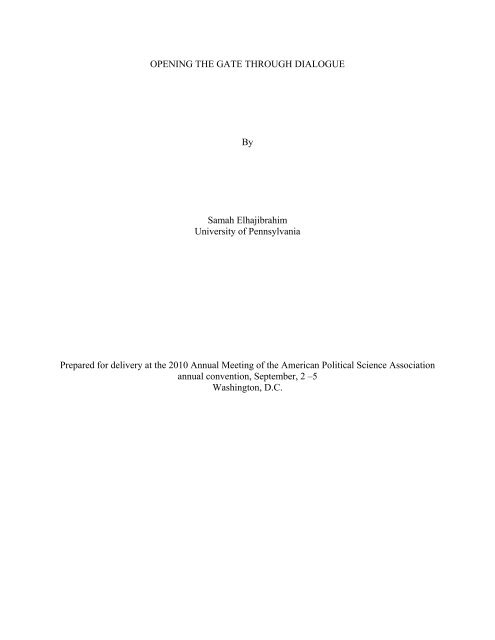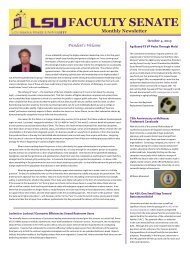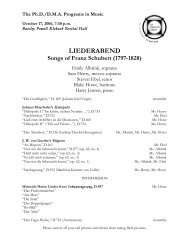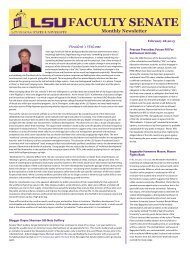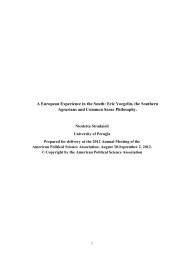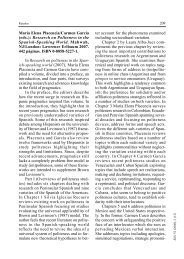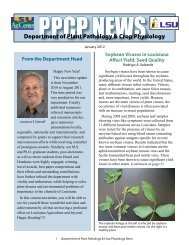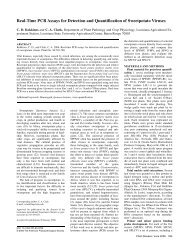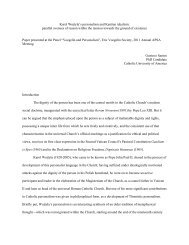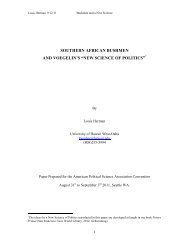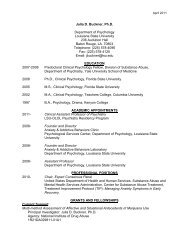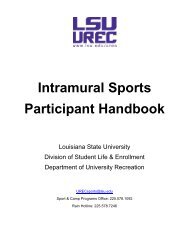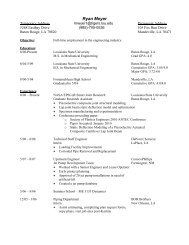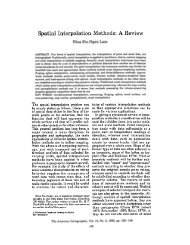Opening the Gate Through Dialogue - Louisiana State University
Opening the Gate Through Dialogue - Louisiana State University
Opening the Gate Through Dialogue - Louisiana State University
You also want an ePaper? Increase the reach of your titles
YUMPU automatically turns print PDFs into web optimized ePapers that Google loves.
OPENING THE GATE THROUGH DIALOGUE<br />
By<br />
Samah Elhajibrahim<br />
<strong>University</strong> of Pennsylvania<br />
Prepared for delivery at <strong>the</strong> 2010 Annual Meeting of <strong>the</strong> American Political Science Association<br />
annual convention, September, 2 –5<br />
Washington, D.C.
OPENING THE GATE THROUGH DIALOGUE<br />
The event of <strong>the</strong> quest is part of a story told by <strong>the</strong> It, and yet a story to be told by <strong>the</strong> human<br />
questioner, if he wants to articulate <strong>the</strong> consciousness of his quest as an act of participation in <strong>the</strong><br />
comprehending story. The “story” thus emerges as <strong>the</strong> symbolism that will express <strong>the</strong> awareness of <strong>the</strong><br />
divine-human movement and countermovement in <strong>the</strong> quest for truth…The story is <strong>the</strong> symbolic form <strong>the</strong><br />
questioner has to adopt necessarily when he gives an account of his quest as <strong>the</strong> event of wrestling, by <strong>the</strong><br />
response of his human search to a divine movement, <strong>the</strong> truth of reality from a reality pregnant with truth<br />
yet unrevealed 1 .<br />
Eric Voegelin, In Search of Order<br />
This symbolic form of expression called ‘story” has existed throughout history in all<br />
civilizations and cultures. Every culture presents itself via a story. It is an ancient method, not<br />
just for entertainment but also for teaching and passing knowledge. Human beings try to<br />
understand <strong>the</strong> world by telling stories about it. Thus, many scholars and novelists have claimed<br />
that human beings are ‘narrative animals.’ We need stories to make sense of our lives, cultures<br />
and experiences. As a form of expression and symbolization ‘story’ conveys not merely<br />
personal-subjective experiences but most importantly <strong>the</strong> human quest for knowledge. It<br />
addresses several aspects of humanity with all of its virtues and vices. It is a reflection of how we<br />
experience our existence that emerges from <strong>the</strong> “It reality.” It contributes to <strong>the</strong> human search for<br />
order, explores being, and illustrates our common humanity and human realities. Thus, as a<br />
reflection of reality, stories are not simple. However, like <strong>the</strong> nature of <strong>the</strong> reality <strong>the</strong>y unveil,<br />
<strong>the</strong>y are complex. They require <strong>the</strong> reader to be imaginatively engaged in order to see <strong>the</strong> world<br />
as it is “given” by experience.<br />
In this paper I am interested in presenting <strong>the</strong> Palestinian narrative, which is rarely heard<br />
in <strong>the</strong> West. Like all narratives, <strong>the</strong> Palestinian’s narrative is a product of <strong>the</strong>ir experience. The<br />
fact that <strong>the</strong> Palestinians and <strong>the</strong> Israelis have conflicting narratives of same events does not<br />
1 Voegelin, Eric. Order and History (Volume V): In Search of Order. <strong>University</strong> of Missouri, 2000. P. 38.
make ei<strong>the</strong>r of <strong>the</strong>m untrue. Each community has its own collective memories that bind <strong>the</strong>m<br />
toge<strong>the</strong>r. For example <strong>the</strong> Israelis call <strong>the</strong> 1948 war <strong>the</strong>ir war of independence, while for <strong>the</strong><br />
Palestinians <strong>the</strong> same war is called Nakba or catastrophe. These symbolic words “independence”<br />
and “Nakba” are reflections of both peoples’ perception and interpretation of <strong>the</strong> event. The story<br />
of <strong>the</strong> war of independence and <strong>the</strong> story of <strong>the</strong> Nakba provide each community with a context<br />
for self understanding and an apprehension of <strong>the</strong>ir collective existence as a community and a<br />
nation. This point was beautifully illustrated by Voegelin, when he argued that <strong>the</strong> idea of a<br />
community “cannot be found anywhere except in <strong>the</strong> mind of <strong>the</strong> people belonging to <strong>the</strong><br />
community and in <strong>the</strong>ir intellectual creations 2 ”. Similarly, <strong>the</strong> idea of <strong>the</strong> Palestinian community<br />
can only be found in <strong>the</strong> mind of <strong>the</strong> Palestinian people who believe in it. For this reason<br />
narratives are real regardless of <strong>the</strong>ir historical accuracy or conflicting symbolizations. As<br />
Voegelin said, “The symbols in which a society interprets <strong>the</strong> meaning of its existence are meant<br />
to be true.” They express reality even if <strong>the</strong>y are <strong>the</strong> creation of <strong>the</strong> imagination for imagination<br />
produces reality. Fur<strong>the</strong>rmore, Edward Said, a Palestinian-American literary <strong>the</strong>orist, said, “The<br />
one place in which <strong>the</strong>re’s been some interesting and innovative work done in Arab intellectual<br />
life is in literary production generally, that never finds its way into studies of <strong>the</strong> Middle East.<br />
You’re dealing with <strong>the</strong> raw material of Politics… You can deal with a novelist as a kind of<br />
witness to something 3 .” Thus, <strong>the</strong>re are many reasons to present <strong>the</strong> Palestinian narrative through<br />
a novel. I will explore <strong>the</strong> novel A Beggar at Damascus <strong>Gate</strong> as a narrative of <strong>the</strong> Palestinian<br />
experience in diaspora.<br />
2 Voegelin, Eric. Race and <strong>State</strong> (The Collected Works of Eric Voegelin, Volume 2). <strong>University</strong> of Missouri, 1997.<br />
P. 120.<br />
3 Singh, Amritjit and Johnson, Bruce G. Interviews with Edward W. Said (Conversations With Public Intellectuals<br />
Series) <strong>University</strong> Press of Mississippi, 2004. P. 52
A Beggar at Damascus <strong>Gate</strong> is a novel written by Yasmin Zahran, a Palestinian<br />
archeologist and a writer. Zahran was born in Ramallah, Palestine. She was educated at<br />
Colombia <strong>University</strong> and <strong>the</strong> <strong>University</strong> of London. She earned her doctorate degree in<br />
archaeology at <strong>the</strong> Sorbonne in Paris. Zahran worked for UNESCO for a number of years. She<br />
also taught at <strong>the</strong> Postgraduate Institute of Archaeology in Jerusalem. Her career as an<br />
archeologist and her education in <strong>the</strong> West allowed her to include both <strong>the</strong> West and <strong>the</strong> East in<br />
her works. Zahran’s first novel, اللحن االول (The First Melody) was directed toward <strong>the</strong> Arabic<br />
reader, for it was written in Arabic in 1991. However, in 1993 Zahran decided to address a<br />
Western audience by writing her second novel A Beggar at Damascus <strong>Gate</strong>, in English.<br />
Nakba: The Palestinian Catastrophe<br />
In order to understand <strong>the</strong> Palestinian perspective, we need to listen to <strong>the</strong>ir stories from<br />
within <strong>the</strong>ir frame of reference. We need to see <strong>the</strong>ir history through <strong>the</strong>ir eyes and not through<br />
<strong>the</strong> lens of our own beliefs and biases. We need to grasp <strong>the</strong> Nakba and its traumatic effect on <strong>the</strong><br />
Palestinian people. Thus, before delving into <strong>the</strong> novel, I will provide a brief background of <strong>the</strong><br />
Palestinian Diaspora as it is perceived and narrated by Palestinians.<br />
“Being at home or going home is something most people take for granted, but for many<br />
Palestinians having a homeland and feeling at home are not part of <strong>the</strong> daily experience 4 .” The<br />
Palestinian exile started in 1948. Palestinians refer to this year as <strong>the</strong> year of nakba (catastrophe).<br />
This term “nakba” depicts <strong>the</strong> disaster that had befallen <strong>the</strong>m in 1948. The Palestinians refute <strong>the</strong><br />
Zionists’ claim that Palestine was a land without a people and argue that <strong>the</strong> massacres that took<br />
4 Hammer, Juliane. Palestinians Born in Exile: Diaspora and <strong>the</strong> Search for a Homeland. Austin <strong>University</strong> of<br />
Texas Press, 2005.
place during this year and that led to <strong>the</strong> dispersion of hundreds of thousands of Palestinians<br />
confirm <strong>the</strong> opposite 5 . This Zionist slogan that Palestine is a “land without a people for a people<br />
without a land” was first coined by Britain and specifically by Lord Shaftesbury:<br />
If Lord Shaftesbury was literally inexact in describing Palestine as a country<br />
without a people, he was essentially correct, for <strong>the</strong>re is no Arab people living in<br />
intimate fusion with <strong>the</strong> country, utilizing its resources and stamping it with a<br />
characteristic impress; <strong>the</strong>re is at best an Arab encampment 6 .”<br />
In 1914 Chaim Weizmann, president of <strong>the</strong> World Zionist Congress who later became <strong>the</strong> first<br />
president of <strong>the</strong> state of Israel said:<br />
In its initial stage, Zionism was conceived by its pioneers as a movement wholly<br />
depending on mechanical factors: <strong>the</strong>re is a country which happens to be called<br />
Palestine, a country without a people, and, on <strong>the</strong> o<strong>the</strong>r hand, <strong>the</strong>re exists <strong>the</strong><br />
Jewish people, and it has no country. What else is necessary, <strong>the</strong>n, than to fit <strong>the</strong><br />
gem into <strong>the</strong> ring, to unite this people with this country?... 7<br />
Like all colonial movements, <strong>the</strong> Zionist movement dehumanized <strong>the</strong> Palestinians in order to<br />
justify <strong>the</strong>ir occupation. The Palestinians were depicted as “conniving”, “dishonest”, “lazy”,<br />
“murderous” and “Nazis” 8 . In 1930, Menahem Ussishkin, one of <strong>the</strong> leading figures of <strong>the</strong><br />
Zionist Yishuv 9 said: “If <strong>the</strong>re are o<strong>the</strong>r inhabitants <strong>the</strong>re, <strong>the</strong>y must be transferred to some o<strong>the</strong>r<br />
place. We must take over <strong>the</strong> land. We have a greater and nobler ideal than preserving several<br />
hundred thousands of Arab fellahin [farmers] 10 .” Palestinians were displaced by Jewish people<br />
and a part of Palestine was renamed Israel. It was an artificial concoction. The expulsion of <strong>the</strong><br />
Palestinians was <strong>the</strong> main strategy of <strong>the</strong> leading figures in <strong>the</strong> Zionist movement such as Israel<br />
Zangwill, Chain Weizman and David Ben Gurion. In <strong>the</strong> 1930’s, <strong>the</strong> Zionist plan was to transfer<br />
5 Masalha, Nur. The Politics of Denial: Israel and <strong>the</strong> Palestinian Refugee Problem. Sterling, VA: Pluto Press, 2003.<br />
P,12.<br />
6 Ibid, 13.<br />
7 Aruri, Naseer, ed. Palestinian Refugees: The Right of Return. Sterling, Va. Pluto Press, 2001. P, 37.<br />
8 Masalha, Nur. The Politics of Denial: Israel and <strong>the</strong> Palestinian Refugee Problem. Sterling, VA: Pluto Press, 2003.<br />
P,12.<br />
9 The term Yishuv refers to <strong>the</strong> Jewish community living in Palestine before <strong>the</strong> establishment of <strong>the</strong> <strong>State</strong> of Israel.<br />
10 Masalha, Nur. The Politics of Denial: Israel and <strong>the</strong> Palestinian Refugee Problem. Sterling, VA: Pluto Press, 2003.<br />
P,14.
<strong>the</strong> Palestinians to Syria, Iraq and Transjordan, following <strong>the</strong> precedent of <strong>the</strong> transfer of <strong>the</strong><br />
Greek and Turkish populations in <strong>the</strong> 1920s 11 . They conducted <strong>the</strong>ir plan, first by putting<br />
restrictions on Palestinians such as issuing taxes and confiscating <strong>the</strong>ir lands. The evacuation of<br />
<strong>the</strong> Palestinians was done with <strong>the</strong> help of <strong>the</strong> British government, for Palestine was still under<br />
its mandate. Weizman held extensive secret discussions with Britain, to transfer one million<br />
Palestinians to Iraq in order to settle Polish Jews in <strong>the</strong>ir place 12 . However, this plan of<br />
transformation was later replaced by an expulsion plan. The intention of <strong>the</strong> Zionist movement<br />
was revealed by Yosef Weitz, <strong>the</strong> director of <strong>the</strong> Settlement Department of Jewish National Fund<br />
(JNF) and <strong>the</strong> head of <strong>the</strong> Israeli government’s official Transfer Committee of 1948. In his diary<br />
Weitz wrote:<br />
Amongst ourselves it must be clear that <strong>the</strong>re is no room for both peoples in this<br />
country. No ‘development’ will bring us closer to our aim to be an independent<br />
people in this small country. After <strong>the</strong> Arabs are transferred, <strong>the</strong> country will be<br />
wide open for us; with <strong>the</strong> Arabs staying <strong>the</strong> country will remain narrow and<br />
restricted ... There is no room for compromise on this point ... land purchasing ...<br />
will not bring about <strong>the</strong> state ... The only way is to transfer <strong>the</strong> Arabs from here to<br />
neighbouring countries, all of <strong>the</strong>m, except perhaps Bethlehem, Nazareth, and Old<br />
Jerusalem. Not a single village or a single tribe must be left. And <strong>the</strong> transfer must<br />
be done through <strong>the</strong>ir absorption in Iraq and Syria and even in Transjordan. For<br />
that goal, money will be found – even a lot of money. And only <strong>the</strong>n will <strong>the</strong><br />
country be able to absorb millions of Jews ... <strong>the</strong>re is no o<strong>the</strong>r solution 13 .<br />
Likewise, Ben Gurion believed that <strong>the</strong> indigenous inhabitants of <strong>the</strong> land had to be expunged in<br />
order to succeed in <strong>the</strong>ir plan of establishing a Jewish state. Thus, he entered <strong>the</strong> 1948 war with<br />
<strong>the</strong> intention of expelling <strong>the</strong> Palestinians. In his war diary he wrote, “During <strong>the</strong> assault we must<br />
be ready to strike a decisive blow; that is, ei<strong>the</strong>r to destroy <strong>the</strong> town or expel its inhabitants so<br />
our people can replace <strong>the</strong>m 14 .” The year of nakba witnessed several massacres, which were<br />
11 Ibid, 19.<br />
12 Ibid, 24.<br />
13 Ibid, 107<br />
14 Aruri, Naseer, ed. Palestinian Refugees: The Right of Return. Sterling, Va. Pluto Press, 2001. P, 43.
mainly committed to terrorize <strong>the</strong> Palestinians and cause <strong>the</strong>m to flee <strong>the</strong>ir homes. Arieh<br />
Yitzhak, <strong>the</strong> Israeli military historian believes that between 1948 and 1949 <strong>the</strong> Zionist movement<br />
had committed about ten major massacres and about 100 smaller massacres 15 . Deir Yassin is one<br />
of <strong>the</strong> most notorious massacres and it is still engraved in <strong>the</strong> memory of <strong>the</strong> Palestinians. Over<br />
250 unarmed villagers mostly elderly people, women and children were murdered and many<br />
were raped 16 . Public knowledge of this massacre was a major cause for Palestinian flight. Its<br />
atrocity and <strong>the</strong> exaggerated rumors that accompanied it precipitated <strong>the</strong> Palestinian Diaspora.<br />
After 1948 and after <strong>the</strong> establishment of <strong>the</strong> state of Israel, as many as 750,000 Palestinians<br />
became homeless, scattered all over <strong>the</strong> world, most of <strong>the</strong>m deprived of basic human rights 17 .<br />
With <strong>the</strong> end of <strong>the</strong> 1948 war, <strong>the</strong> Palestinians who fled <strong>the</strong>ir homes were deprived of going back<br />
and all of <strong>the</strong>ir properties and lands were confiscated and given to <strong>the</strong> new inhabitants. Thus, <strong>the</strong><br />
year of nakba witnessed <strong>the</strong> birth of <strong>the</strong> problem of <strong>the</strong> Palestinian refugees.<br />
In <strong>the</strong> 1967 war or <strong>the</strong> so-called “six day war”, Palestinians were once again forced to<br />
flee <strong>the</strong>ir homes. As Israel occupied Gaza, <strong>the</strong> West Bank and East Jerusalem, 325,000<br />
Palestinians, sought refuge in neighboring Arab states 18 . Some of <strong>the</strong>se refugees had already<br />
been displaced in 1948. This dispersion of <strong>the</strong> Palestinians was generated by <strong>the</strong> destruction of<br />
several villages, threats, mass detention of male civilians and many o<strong>the</strong>r policies. Thus, this was<br />
<strong>the</strong> second exodus of <strong>the</strong> Palestinians but not <strong>the</strong> last. The Palestinian displacement continued<br />
during <strong>the</strong> 1970’s, 1980’s and 1990’s. An average of 21,000 Palestinians per year are forced out<br />
15 Ibid. P, 46.<br />
16 Ibid.<br />
17 Ibid. P, 228.<br />
18 Exchange, Global. "The Palestinian Diaspora: A History of Disposession". San Francisco, CA, October 2005.<br />
.
of Israeli-controlled areas 19 . Despite <strong>the</strong> fact that in 1948 Israel's admission to <strong>the</strong> UN was<br />
conditioned upon an Israeli commitment to carry out UN resolution 194, which calls on Israel to<br />
recognize <strong>the</strong> right of <strong>the</strong> refugees to return to <strong>the</strong>ir homes, Israel has failed to comply with this<br />
resolution. The resolution states that, “Refugees who wish to return to <strong>the</strong>ir homes and live at<br />
peace with <strong>the</strong>ir neighbors should be permitted to do so at <strong>the</strong> earliest practical date, and that<br />
compensation should be paid for <strong>the</strong> property of those choosing not to return 20 ”. Today, <strong>the</strong><br />
Palestinians are considered <strong>the</strong> largest refugee population in <strong>the</strong> world; estimated at about 5<br />
million 21 . This only includes those registered with <strong>the</strong> United Nations Relief and Works Agency<br />
(UNRWA). Palestinian refugees consist of two major categories, those displaced in 1948 from<br />
what is now Israel, and those displaced in 1967 from what is now <strong>the</strong> West Bank and Gaza.<br />
Palestinian refugees tend to identify <strong>the</strong>mselves as ei<strong>the</strong>r <strong>the</strong> ‘48 lot or <strong>the</strong> ‘67 lot. The return of<br />
<strong>the</strong> ’48 lot to Israel constitutes a major stumbling block in Peace negotiations and a<br />
“demographic” problem for Israel.<br />
Only Palestine is Real<br />
In A Beggar at Damascus <strong>Gate</strong>, Zahran brings Palestine to <strong>the</strong> forefront for an audience<br />
that is rarely exposed to it. She defies <strong>the</strong> world by replanting Palestine in <strong>the</strong> memory of <strong>the</strong><br />
West after it had faded away. She furnishes her novel with <strong>the</strong> Palestinian Diaspora and <strong>the</strong><br />
subsequent struggle. Edward Said stated that “There is no getting away from <strong>the</strong> fact that, as an<br />
idea, a memory, and as an often buried or invisible reality, Palestine and its people have simply<br />
19 Ibid.<br />
20 Ibid.<br />
21 Ibid.
not disappeared 22 ”. In her novel, Zahran confronts <strong>the</strong> Western reader with this reality that<br />
Palestinians and Palestine still exist. Zahran tries to revive <strong>the</strong> Western conscience toward <strong>the</strong><br />
Palestinian problem through <strong>the</strong> characters in <strong>the</strong> novel. In fact, she begins <strong>the</strong> novel with <strong>the</strong><br />
statement, “All characters in this book are fictitious, only Palestine is real 23 ”. Zaharan exposes<br />
her reader to her experience of social and political disorder and her resistance and search for a<br />
new social order. Her novel addresses not only <strong>the</strong> Palestinian problem but also <strong>the</strong> problem of<br />
human nature with life and death, love and hate being at <strong>the</strong> center of <strong>the</strong> story.<br />
Like most Palestinians who live in exile, deprived of <strong>the</strong>ir homeland, Zahran’s novel is<br />
homeless, deprived of a location. The story begins in Petra, Jordan but its events take place in<br />
over twenty countries until it finally reaches its final destination, Palestine. The story is about a<br />
relationship between a Palestinian woman writer in exile, Rayya and a British Archeologist,<br />
Alex. It depicts <strong>the</strong> interaction between <strong>the</strong> Orient and <strong>the</strong> Occident and <strong>the</strong> mistrust that exists<br />
between <strong>the</strong>m. It begins in Petra, Jordan, in 1980 with <strong>the</strong> narrator, Mr. Foster, an American<br />
Archeologist born and raised in Beirut, Lebanon. In his hotel room, Mr. Foster finds <strong>the</strong> journals<br />
of <strong>the</strong> two protagonists, Rayya and Alex. The narrator reads <strong>the</strong>ir Journals, which begin at <strong>the</strong>ir<br />
meeting in London in 1969. The story of Rayya and Alex depicts <strong>the</strong> conflict between <strong>the</strong>ir<br />
personal relationship on one hand and <strong>the</strong>ir national identities and political allegiances on <strong>the</strong><br />
o<strong>the</strong>r. Rayya is a Palestinian refugee who is affiliated with <strong>the</strong> Palestine Liberation Organization<br />
(PLO) and Alex is apparently a spy for an unknown foreign agency. The story is told from both<br />
of <strong>the</strong>ir perspectives, which at times differ in <strong>the</strong>ir perceptions of reality. It is akin to a split<br />
screen film where <strong>the</strong> viewer is able to see both points of view simultaneously. They have an<br />
intimate relationship and yet <strong>the</strong>y mistrust one ano<strong>the</strong>r. The story depicts a kind of Cold War<br />
22 Said, Edward. "Palestine Has Not Disappeared." Le Monde Diplomatique May 1998.<br />
23 Zahran, Yasmin. A Beggar at Damascus <strong>Gate</strong>. Sausalito, California: The Post-Apollo Press, 1995. P, i.
etween <strong>the</strong> two lovers, full of espionage on both <strong>the</strong> personal and national levels. The narrator<br />
attempts to unite both perspectives of <strong>the</strong> story and states, “My task was to join <strong>the</strong> two versions<br />
which were as different as <strong>the</strong> two faces of <strong>the</strong> moon, conflicting and contradictory and yet <strong>the</strong><br />
two sides of one reality 24 ”. Both are aware that <strong>the</strong> o<strong>the</strong>r may not be what <strong>the</strong>y seem. For<br />
example, at one point in <strong>the</strong> story, Rayya discovers that Alex reads Arabic after she finds him<br />
looking at her journal. Alex suspects that Rayya works for <strong>the</strong> PLO. We know very little about<br />
Alex because he only wrote about his life with Rayya, whereas Rayya wrote about her life with<br />
and beyond Alex. They lived separately and met during <strong>the</strong>ir travels. Their relationship ends<br />
when Alex mysteriously dies in Petra as if murdered by a spy agency. In her attempt to escape<br />
without being interrogated by <strong>the</strong> police, Rayya hides <strong>the</strong> manuscripts, which are later found by<br />
Mr. Foster, our narrator. The remainder of <strong>the</strong> story consists of Mr. Foster searching for Rayya to<br />
get her permission to publish <strong>the</strong> journals. After nine years he finds her in Jerusalem where she is<br />
a beggar at Damascus <strong>Gate</strong>, working with <strong>the</strong> Palestinian resistance during <strong>the</strong> first Palestinian<br />
Intifada.<br />
Rayya and Alex: The East and <strong>the</strong> West<br />
Yasmin Zahran limits her novel to two main characters, Rayya and Alex, highlighting <strong>the</strong><br />
relationship between <strong>the</strong> West and <strong>the</strong> Arab world. By using <strong>the</strong>ir journals, Zahran provides an<br />
opportunity for each character to describe <strong>the</strong> relationship and how <strong>the</strong>y perceive one ano<strong>the</strong>r. In<br />
addition, Zahran presents a third point of view, that of <strong>the</strong> narrator, which comments on <strong>the</strong><br />
relationship between Alex and Rayya. Therefore, <strong>the</strong> reader hears <strong>the</strong> story from three different<br />
24 Ibid. P, 25.
perspectives, emphasizing <strong>the</strong> fact that <strong>the</strong>re are always more than one perspective to a story or<br />
even to a historical account.<br />
Long before meeting Rayya, Alex had heard tales about her. She was described as “an<br />
institution” and an “unchanneled, rushing river whose direction could not be known 25 ”. The<br />
friend who introduced <strong>the</strong>m described her as a “phenomenon 26 ”. From <strong>the</strong>ir first meeting, Alex<br />
became obsessed with conquering Rayya with all her mystery, “My obsession grew as did my<br />
love. I wanted to possess her past, her present and her future 27 ”. This resembles Western<br />
obsession with conquering <strong>the</strong> Arab world beginning with <strong>the</strong> crusades, passing through World<br />
War I and ending with more recent conquests. In London, in 1969, Alex encountered this<br />
‘phenomenon’ and shortly afterward, he fell a victim of this ‘rushing river’. In his journal, Alex<br />
described his first meeting with Rayya, “She was sitting in a corner of our common friend’s flat<br />
in Grosvenor street in a red pleated silk dress 28 ”. Rayya spoke with a mysterious accent. Alex<br />
later found out that Rayya was able to speak English and French like a native but she<br />
intentionally kept her accent to “mark her foreignness, her rootlessness and her exile 29 ”. This<br />
depicts Rayya’s desire to declare her identity as a Palestinian. Having lost her homeland Rayya<br />
appears to compensate by holding on to trivial things, such as her accent.<br />
Alex and Rayya fell in love with each o<strong>the</strong>r despite having separate lives full of turmoil<br />
and flux. Their journals revealed <strong>the</strong>ir multifaceted relationship full of love, passion, fear and<br />
mistrust. Alex described Rayya as an “Artist hiding behind many veils, following a thousand<br />
roads… 30 ”. Likewise, Rayya described Alex as elusive, ephemeral and that she never felt on<br />
25 Ibid. P, 29.<br />
26 Ibid.<br />
27 Ibid. p, 34.<br />
28 Ibid. P, 29.<br />
29 Ibid. P, 30.<br />
30 Ibid. P, 48-49.
solid ground with him, “a subterranean creature, a dweller of <strong>the</strong> half-shadows… 31 ”. Thus, <strong>the</strong>y<br />
were both elusive and <strong>the</strong>y feared and mistrusted each o<strong>the</strong>r. The thorn that is ever present in this<br />
already unsteady relationship is <strong>the</strong> complex that is based on <strong>the</strong>ir national origins and all of its<br />
implications. Mr. Arthur James Balfour was omnipresent between Rayya and Alex. Balfour was<br />
<strong>the</strong> wall that separated <strong>the</strong> two lovers. This is clear from Rayya’s journal in which she wrote: “I<br />
cannot say to you- your people shall be my people, your gods shall be my own…Your people<br />
sold my people. Your people gave away my land, my earth, my blood. Your kin bartered my<br />
heritage, my future… 32 ”. Alex behaved much like <strong>the</strong> British government, which promised<br />
Palestine to <strong>the</strong> Arabs and <strong>the</strong> Zionists at <strong>the</strong> same time. Alex was engaged in an intimate<br />
relationship with Rayya while spying on her. Rayya on <strong>the</strong> o<strong>the</strong>r hand, was unlike <strong>the</strong> Arabs who<br />
had trusted <strong>the</strong> British back <strong>the</strong>n. She was mistrustful of Westerners and <strong>the</strong> West, like most<br />
Palestinians who heard one thing from <strong>the</strong> West and saw ano<strong>the</strong>r. Palestinian mistrust of <strong>the</strong><br />
West was also pointed out by <strong>the</strong> narrator, Mr. Foster who said about his encounter with <strong>the</strong><br />
Palestinian cook at <strong>the</strong> hotel, “What amazed me though was not his anglophobia, for it is rare to<br />
find a Palestinian who is not 33 ”. Rayya grew more suspicious of Alex when she caught him<br />
reading her journal and discovered that he reads Arabic. Their relationship was full of<br />
manipulation. Rayya started manipulating Alex by inserting false information about <strong>the</strong> PLO in<br />
her journal and intentionally making it available for him to read. Likewise, Alex used Rayya to<br />
gain information about <strong>the</strong> PLO, to have her introduce him to her Arab friends, and to travel with<br />
her to <strong>the</strong> Arab world where he took pictures of “forbidden sites and targets 34 ”. By creating a<br />
relationship based on manipulation and mistrust, <strong>the</strong> author symbolizes <strong>the</strong> larger relationship<br />
31 Ibid. P, 32.<br />
32 Ibid. P, 72.<br />
33 Ibid. P, 15.<br />
34 Ibid. P, 121.
etween <strong>the</strong> West and <strong>the</strong> Arab world. Alex’s and Rayya’s relationship is a microcosm of <strong>the</strong><br />
relationship between <strong>the</strong> West and <strong>the</strong> Arab world in general and <strong>the</strong> West and Palestine in<br />
particular. In his journal, Alex described his relationship with Rayya as follows, “Both running<br />
on divergent orbits to reach-where? Both racing to outwit and outpass each o<strong>the</strong>r. Both living<br />
under a cloud of duplicity. Who is cheating whom? 35 ”. This quotation can also describe <strong>the</strong><br />
relationship between <strong>the</strong> West and <strong>the</strong> Arab world. Rayya and Alex’s relationship resembles a<br />
relationship between two countries, two enemies and not between two lovers. Likewise, duplicity<br />
has plagued <strong>the</strong> relationship between <strong>the</strong> West and <strong>the</strong> Arab world for centuries. The duplicity<br />
was present during <strong>the</strong> time of Henry McMahon (1915) who promised <strong>the</strong> Arabs <strong>the</strong>ir<br />
independence while signing <strong>the</strong> Sykes Picot agreement with France, in which <strong>the</strong>y decided to<br />
conquer and divide <strong>the</strong> region. Western duplicity with respect to <strong>the</strong> Arabs and to <strong>the</strong><br />
Palestinians in particular is with us to this day. During Israel’s recent war on Lebanon, <strong>the</strong><br />
United <strong>State</strong>s spoke about peace while shipping smart bombs to Israel. There is also duplicity in<br />
<strong>the</strong> enforcement of international agreements. The West, especially <strong>the</strong> United <strong>State</strong>s and United<br />
Kingdom, tend to strictly enforce UN resolutions passed against Arab countries and ignore<br />
resolutions against Israel. Recent examples of this include UNSC resolution 1559, which<br />
demanded Syrian withdrawal from occupied Lebanese territory and UNSC resolutions 465 and<br />
476 which demanded Israeli withdrawal from all Arab occupied territories. In <strong>the</strong> case of 1559,<br />
<strong>the</strong> United <strong>State</strong>s and Britain threatened Syria with military force if it did not comply.<br />
Conversely, <strong>the</strong> United <strong>State</strong>s continues to turn a blind eye to Israeli occupation of Arab lands<br />
and <strong>the</strong> building of settlements on <strong>the</strong>se lands while sending billions of dollars in aid to Israel.<br />
These stark examples practically define <strong>the</strong> duplicitous relationship of <strong>the</strong> West with <strong>the</strong> Arabs<br />
beginning with Sykes Picot and continuing until today.<br />
35 Ibid. P, 49.
The Struggle for National Survival<br />
Despite <strong>the</strong>ir passion for each o<strong>the</strong>r, both Rayya and Alex failed to be compassionate or<br />
understanding toward one ano<strong>the</strong>r. This lack of compassion and understanding is evident in <strong>the</strong>ir<br />
journals, where Alex said, “Rayya was beyond certain limits of my comprehension…What do I<br />
know of this glittering creature, for wherever I turn, only <strong>the</strong> top of <strong>the</strong> iceberg is revealed 36 ”.<br />
Likewise, Rayya wrote, “There is nothing simple about him… 37 Is he a man? A force? What is<br />
he? 38 ” Alex did not only fail to be compassionate and understanding towards Rayya and her<br />
cause but he also tried to define her. Rayya, like most refugees, unable to return to her homeland<br />
and lacking a connection with her nation, compensated for this void by holding onto various<br />
ephemeral characteristics that she associated with her identity. These are sometimes trivial<br />
behaviors or attachments like deliberately speaking with an accent. Rayya goes to great lengths,<br />
grasping at straws to attach herself to this identity. Despite this grasping attachment to Rayya’s<br />
disappearing nation and nationality, Alex is unable to simply empathize with her. He presumes to<br />
define her and is unable to accept her definition of herself. To him she does not have a natural<br />
right to define who she is. He says, “tell me modern and westernized as you are, what do you<br />
have in common with an Omani Arab, or a Mauritanian Arab? 39 ” and “For she was living in<br />
France and whe<strong>the</strong>r she liked it or not was very Parisian 40 ”. <strong>Through</strong>out <strong>the</strong> book Alex’s<br />
treatment of Rayya carries an agenda. He does not seem to care for a true knowledge of who she<br />
is. He appears to be on a “campaign of self affirmation.” It is as if Rayya’s identity as a<br />
36 Ibid. P, 19.<br />
37 Ibid. p, 65.<br />
38 Ibid. P, 10.<br />
39 Ibid. P, 39.<br />
40 Ibid. P, 90.
Palestinian Arab creates too much cognitive dissonance in his mind that he prefers to define her<br />
in a more palatable way.<br />
In addition to Alex’s bizarre attempts to rip Rayya from <strong>the</strong> roots of her Palestinian<br />
identity, he tries to create distance between her and o<strong>the</strong>r Arabs. He tries to convince her that<br />
Arab unity is a failed cause. He tells her, “I only want to know how this projected utopia of a<br />
united Arab world would help your cause. Your Arab bro<strong>the</strong>rs seem to have forgotten about<br />
Palestine 41 ”. The question that arises is why does Alex seem threatened by Arab unity? This<br />
following quotation explains his fear:<br />
I wondered if it ever occurred to Rayya that <strong>the</strong> West had interests in <strong>the</strong> Arab<br />
world all of its own. And an image flashed in my mind of a very honorable<br />
gentleman moving his cane over a huge map and saying, ‘If that dream of Arab<br />
unity is one day realized, it will become an immediate threat to our way of life<br />
and our standard of living. Just remember that raw materials will become<br />
expensive and scarce. Strategically we will be at <strong>the</strong>ir mercy for <strong>the</strong>y are at <strong>the</strong><br />
crossroads of a shrinking world… And <strong>the</strong> group of people that you must watch,<br />
split, harass and if necessary destroy, are <strong>the</strong> Palestinians, for <strong>the</strong>y, more than any<br />
o<strong>the</strong>r Arab people, need this unity for survival. Strike at <strong>the</strong> Palestinians and you<br />
shatter <strong>the</strong> core of Arab unity 42 .<br />
Firstly, his description of <strong>the</strong> man with a cane as honorable states his position. Secondly, his<br />
statement begins as justification for <strong>the</strong> West’s action, namely to protect <strong>the</strong>ir interests. What<br />
is alarming about his statement is <strong>the</strong> extent to which <strong>the</strong> ends justify <strong>the</strong> means according to<br />
Alex. The “honorable” gentleman imagined by Alex, openly advocates destroying <strong>the</strong><br />
Palestinians if <strong>the</strong>y have to. The ease with which Alex, in his journal, advocated genocide as<br />
a means to a ra<strong>the</strong>r mundane end, namely <strong>the</strong> protection of Western interests, is an example<br />
of <strong>the</strong> banality of evil. Alex’s tactics are eerily similar to <strong>the</strong> tactics used by <strong>the</strong> British<br />
Empire, namely, divide and rule.<br />
41 Ibid. P, 69<br />
42 Ibid.
Rayya rejects Alex’s discourse on every level. She vehemently argues with Alex about<br />
her identity, “My westernization is fake. It is only a thin veneer… I can accept <strong>the</strong> term<br />
‘westernized’ if you mean by that <strong>the</strong> common heritage <strong>the</strong> Arab world shares with Europewhich<br />
begins with <strong>the</strong> Phoenicians, <strong>the</strong> Greeks and <strong>the</strong> Romans 43 ”. The author is effective in<br />
portraying <strong>the</strong> Palestinians’ struggle for preserving <strong>the</strong>ir national identity which is often<br />
contested in <strong>the</strong> west. Like Alex, who failed to empathize with Rayya, <strong>the</strong> west fails to feel <strong>the</strong><br />
Palestinians’ agony and refuses to recognize <strong>the</strong>m as people with <strong>the</strong>ir own national identity, an<br />
identity that is attached to <strong>the</strong> land of Palestine.<br />
Rayya, Palestine’s Banner<br />
“I am <strong>the</strong> olive tree on <strong>the</strong> hills of Palestine. I am <strong>the</strong> spring of water in its valleys. I am<br />
<strong>the</strong> smell of its parched, naked soil 44 ”. This is how Rayya described herself. After <strong>the</strong> loss of<br />
<strong>the</strong>ir homeland and after <strong>the</strong> world had refused to recognize <strong>the</strong>ir country, <strong>the</strong> Palestinians chose<br />
to equate <strong>the</strong>mselves with Palestine. Like Rayya, most Palestinian refugees choose to have<br />
Palestine inhabit <strong>the</strong>ir life since <strong>the</strong>y are unable to inhabit Palestine, “She [Rayya] had to carry<br />
Palestine, whe<strong>the</strong>r in her heart or on her shoulders, at all times, and wherever she was, for this<br />
was <strong>the</strong> only way she could endure her exile 45 ”. Since <strong>the</strong> truth of human experience is in its<br />
memory, Rayya tries to preserve in her memory all of <strong>the</strong> images of Palestine. It is through<br />
memory <strong>the</strong> Palestinians pass on <strong>the</strong>ir collective experience of <strong>the</strong> land. They compensate for <strong>the</strong><br />
loss of <strong>the</strong>ir homeland, by holding on to <strong>the</strong>ir national culture and collective memory. This<br />
43 Ibid. P, 39.<br />
44 Ibid. P, 157.<br />
45 Ibid. P, 90.
strategy allows Palestinians who were born in exile and never saw Palestine to keep <strong>the</strong>ir<br />
national identity.<br />
<strong>Through</strong> Rayya, <strong>the</strong> author reveals to <strong>the</strong> reader <strong>the</strong> impact of exile and uprootedness on<br />
every aspect of Palestinian life. Yasmin Zahran shows <strong>the</strong> reader how Rayya’s experience in<br />
exile shaped her personality. Like her life, Rayya’s journal is chaotic. Rayya lacked any sense of<br />
time or direction. Like many Palestinian refugees, Rayya was fixated on two dates, namely 1948<br />
and 1967. The fact that Palestinians to this day refer to <strong>the</strong>mselves as <strong>the</strong> “’48 lot” or “’67 lot”<br />
shows that time has stopped <strong>the</strong>re for <strong>the</strong>m. In his journal, Alex described how Rayya was<br />
disoriented, “This creature …did not have any sense of direction or distance and could never tell<br />
North from South; she could even lose her way home 46 ”. The author uses Rayya’s lack of a sense<br />
of direction as a symbol of her rootlesness, “I was born without <strong>the</strong> faculty of direction,<br />
something which reduces my defenses against <strong>the</strong> world 47 ”.<br />
We travel like o<strong>the</strong>r people, but we return to nowhere. As if traveling is<br />
<strong>the</strong> way of <strong>the</strong> clouds…We have a country of words. Speak speak so I can put my<br />
road on <strong>the</strong> stone of a stone…We have a country of words. Speak speak so we<br />
may know <strong>the</strong> end of this travel 48 .<br />
This poem captures <strong>the</strong> bereavement of Rayya and all Palestinian refugees. In <strong>the</strong> novel, Mr.<br />
Foster said, “It seemed to me that for Rayya a voyage was an end in itself, a search for things<br />
past that was mirrored in <strong>the</strong> search for her fragmented self 49 ”. Having nowhere to call home,<br />
Rayya’s excessive travels are a search for something missing. What is missing is <strong>the</strong> coalescence<br />
in one place of a shared national identity, a sense of belonging, an acceptance by o<strong>the</strong>rs, and a<br />
legitimacy for existence. A pertinent analogy here is a comparison with <strong>the</strong> homeless. There are<br />
46 Ibid. P, 48.<br />
47 Ibid.<br />
48 The Palestinian Poet, Mahmoud Darwish, We Travel Like O<strong>the</strong>r People<br />
http://www.shaml.org/A%20country%20of%20words.htm<br />
49 Ibid. P, 49.
a great many comforts that are taken for granted by most of us who have places to live. Being<br />
homeless impacts many aspects of daily life, leading to instability, vulnerability and a feeling of<br />
rejection by society. Similarly, a stateless person lacks many of <strong>the</strong> comforts taken for granted by<br />
those who belong. These are less tangible but also destabilizing to <strong>the</strong> psyche. Palestinian<br />
refugees are deprived of having a home to belong to. This was pointed out by Rayya who said,<br />
“Everybody has a right to belong, but I am deprived of that right! 50 ” At <strong>the</strong> end of <strong>the</strong> novel Mr.<br />
Foster said, “She [Rayya] symbolized for me <strong>the</strong> uprooted, <strong>the</strong> exiled, <strong>the</strong> oppressed 51 ”. In<br />
addition, Rayya was <strong>the</strong> banner of Palestine. The author skillfully chooses <strong>the</strong> name of her<br />
protagonist. In Arabic <strong>the</strong> word “Rayya” means banner.<br />
Mr. Foster: Fostering Hope<br />
Edward Said, wrote, “Above all we must, as Mandela never tired of saying about his<br />
struggle, be aware that Palestine is one of <strong>the</strong> great moral causes of our time. Therefore, we need<br />
to treat it as such. It's not a matter of trade, or bartering negotiations, or making a career. It is a<br />
just cause… 52 ”. Mr. Foster tried genuinely to understand Rayya and her cause. He did not have a<br />
specific agenda. His only agenda was to give Palestinians <strong>the</strong> right to narrate. True to his name,<br />
Mr. Foster nurtured and brought to light <strong>the</strong> story of Palestine, “I felt all powerful, for I had <strong>the</strong><br />
means to expose <strong>the</strong> story of a Palestinian girl to <strong>the</strong> light, lining up behind her thousands of<br />
silent women who lived in <strong>the</strong> shadows and who, culminating in her, had at last <strong>the</strong> power to<br />
speak 53 ”. Unlike Alex, Mr. Foster’s interest in Rayya and her cause was au<strong>the</strong>ntic. He did not<br />
50 Ibid. P, 31.<br />
51 Ibid. P, 133.<br />
52 Said, Edward. "Thinking Ahead". Al-Ahram Weekly. April 2002.<br />
.<br />
53 Zahran, Yasmin. A Beggar at Damascus <strong>Gate</strong>. Sausalito, California: The Post-Apollo Press, 1995. P, 24.
impose his own views on Rayya, but was able to empathize with her and her people, “I was<br />
seeing things with Rayya’s eyes seeking <strong>the</strong> light of <strong>the</strong> Jerusalem hills she had so longed<br />
for 54 …”<br />
Some scholars such as Homi Bhabha and Edward Said have argued that ‘nations<br />
<strong>the</strong>mselves are narrations. 55 ” This notion illustrates <strong>the</strong> importance of narrative in building or<br />
preserving a nation. Thus, to take from people <strong>the</strong> right to narrate is to deprive <strong>the</strong>m of <strong>the</strong>ir<br />
history and a collective memory as a people of cultural heritage. In her novel, Zahran stresses <strong>the</strong><br />
importance of narrative to a nation by making her two main characters narrate <strong>the</strong>ir stories freely,<br />
each in <strong>the</strong>ir own native languages. Thus, emphasizing <strong>the</strong> au<strong>the</strong>nticity of each narrative. The<br />
author sits aside and let her protagonist Rayya borrow her novel, to narrate her story, <strong>the</strong><br />
Palestinian story, <strong>the</strong> story of return and search for legitimacy. Fur<strong>the</strong>rmore, by introducing Mr.<br />
Foster, <strong>the</strong> author creates a space for <strong>the</strong>se narratives to live, be heard and shared not just by <strong>the</strong><br />
Palestinians but most importantly by <strong>the</strong> “o<strong>the</strong>r”, The “o<strong>the</strong>r” who is different and similar at <strong>the</strong><br />
same time. The “o<strong>the</strong>r” is who we share our humanity with and narrative is <strong>the</strong> vehicle through<br />
which we experience life with o<strong>the</strong>rs. Mr. Foster shared Rayya’s experience and felt her pain,<br />
trying to acquire legitimacy for her people and a territory of <strong>the</strong>ir own. For this reason, unlike<br />
Alex, Mr. Foster felt responsible to disclose Rayya’s journal and thus opening <strong>the</strong> gate of<br />
dialogue with <strong>the</strong> o<strong>the</strong>r.<br />
In In Search for Order, Voegelin asked <strong>the</strong> question “how does <strong>the</strong> listener recognize <strong>the</strong><br />
story to be true…ra<strong>the</strong>r than consider it somebody's private opinion concerning <strong>the</strong> order of his<br />
preference?” His answer came as follows: “[<strong>the</strong> story] will have no authority of truth unless it<br />
speaks with an authority common present in everybody’s consciousness…[unless it] indeed<br />
54 Ibid. P, 143.<br />
55 To read more about this look at Edward Said’s book Culture and Imperialism, Benedict Anderson’s Imagined<br />
communities: Reflections on <strong>the</strong> Origin and Spread of Nationalism and Homi Bhabha’s book Nation and Narration.
speaks what is common to <strong>the</strong> order of man’s existence as a partner in <strong>the</strong> comprehending<br />
reality 56 ”. Mr. Foster did not refuse to apperceive reality like <strong>the</strong> former Israeli Prime Minister<br />
Golda Meir who said, “There are no Palestinians 57 ”. He saw in Rayya’s story something that is<br />
common to everybody’s consciousness and that is <strong>the</strong> right to an identity and to narrate <strong>the</strong><br />
collective memory of your people.<br />
A Beggar at Damascus <strong>Gate</strong> is, first and foremost, a story that brings <strong>the</strong> Palestinian<br />
narrative to <strong>the</strong> western audience that has largely forgotten about it and its people in Diaspora.<br />
The story is a window into <strong>the</strong> relationship between East and West, portrayed through two<br />
characters, who, also happen to come from Palestine and Britain, a former colony and a former<br />
colonizer. It displays <strong>the</strong>ir chaotic, mistrustful relationship and <strong>the</strong> conflicts that exist because<br />
<strong>the</strong>y each carry historical baggage that <strong>the</strong>y are unable to shed. Zahran also implicitly reiterates<br />
that <strong>the</strong> relationship between <strong>the</strong> West and <strong>the</strong> Arab world can only be rehabilitated by resolving<br />
<strong>the</strong> Palestinian problem. The road to a healthy Western-Arab relationship not only passes<br />
through Palestine but most importantly it passes through everybody’s consciousness.<br />
56 Voegelin, Eric. Order and History (Volume V): In Search of Order. <strong>University</strong> of Missouri, 2000. P. 40.<br />
57 http://news.bbc.co.uk/1/hi/events/israel_at_50/profiles/81288.stm


